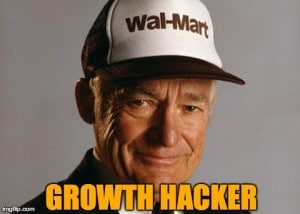What I Learned from Sam Walton, the Legendary Retail Growth “Hacker”
 When thinking about innovation and technology, Sam Walton probably isn’t the first person you think about, and Wal-Mart may not be one of the first companies. Americans in the Millenial Generation often take Wal-Mart for granted — it’s the huge store with low prices, and locations in every town you live in, drive through, or visit. We have never known life without Wal-Mart, we have never known life without discount retailers, and we did not observe its rise.
When thinking about innovation and technology, Sam Walton probably isn’t the first person you think about, and Wal-Mart may not be one of the first companies. Americans in the Millenial Generation often take Wal-Mart for granted — it’s the huge store with low prices, and locations in every town you live in, drive through, or visit. We have never known life without Wal-Mart, we have never known life without discount retailers, and we did not observe its rise.
Once upon a time, Wal-Mart was a start-up. We never knew it or have forgotten about it. I believe we could stand to learn more about innovation and technology by learning more about Wal-Mart, the creation of the discount retail market, and the innovation that brought about its rise and success. Wal-Mart sits atop the Fortune 500 list for 2013 and had $443.9 billion in sales for 2012.
In the tech community (the folks that hang out on Hacker News and obsess over TechMeme all day), I don’t see many articles about Wal-Mart. HN Search turns up only three stories with the term “Wal-Mart” or “Walmart” in the story title with over 100 points, and one of them is about Amazon. Contrast that with a quick search for “Amazon” in the title and you’ll see stories with 100+ points until the 18th page (as of Dec. 23, 2013; it’ll change with time).
I started studying Wal-Mart after reading a book about Amazon. In November, I finished reading Brad Stone’s book about Amazon called The Everything Store, and it pointed a fairly large sign at Wal-Mart and Sam Walton as a source of inspiration for Bezos. The book mentioned it, and listed Sam Walton’s “Made in America” book second on “Jeff’s Reading List” in the appendix. (I consider this appendix the most valuable part of “The Everything Store”.)
Next, I read “Made in America” and finished it in two days. Let me share with you what I learned from Sam Walton through this book.
Sam Walton was a growth “hacker”
Sam Walton got after it. He began working and learning about business from a young age. He wasn’t afraid to try new things. He experimented.
He ran a Ben Franklin five-and-dime store and created a few Walton’s Five and Dime stores. He learned new ideas about retail in the process, and continued learning with his first Wal-Mart store and every subsequent store he opened.
His entire life, he studied the competition. He drew in customers with low prices, and kept them coming back for more. From there, he rolled out more stores, drew in more customers with the same value proposition, and continued growing Wal-Mart until stepping down from CEO and President in 1988. He passed away in 1992.
I can’t point you to a simple formula, and the summary above leaves out so much. I would recommend reading his book and studying his methods – you can’t replace a book with a blog post. In the book, he says a lot about how he started the company, why he started the company, and how it was able to succeed and grow. He even discusses how other companies can compete with it.
I’d like to share with you several of my favorite quotes from the book. The business wisdom contained within is relevant to startups and other businesses.
Get after it
“When folks have asked me, “How did Wal-Mart do it?” I’ve usually been flip about answering them. “Friend, we just got after it and stayed after it,” I’d say.”
Frugality
“We exist to provide value to our customers, which means that in addition to quality and service, we have to save them money. Every time Wal-Mart spends one dollar foolishly, it comes right out of our customers’ pockets. Every time we save them a dollar, that puts us one more step ahead of the competition—which is where we always plan to be.”
“… if we get a great deal, pass it on to the customer.”
Bias for Action
“Looking back on such boyhood episodes helps me to realize now that I’ve always had a strong bias toward action—a trait that has been a big part of the Wal-Mart story.”
Compete
“If I had to single out one element in my life that has made a difference for me, it would be a passion to compete.”
Charlie Cate:
“I remember him saying over and over again: go in and check our competition. Check everyone who is our competition. And don’t look for the bad. Look for the good.”
Change the rules
“We paid absolutely no attention whatsoever to the way things were supposed to be done, you know, the way the rules of retail said it had to be done.”
Growth
“When you’re opening 150 stores a year the way we do these days, a lot of your planning is necessarily short term. But to sustain that kind of growth, you constantly have to consider what you’re going to be doing five years out.”
Technology
Sam Walton used cutting edge technology. He revolutionized retail and enabled Wal-Mart’s expansion and growth by investing in technology while maintaining frugality and passing on the savings to the customer.
Abe Marks:
“And this is a very important point: without the computer, Sam Walton could not have done what he’s done. He could not have built a retailing empire the size of what he’s built, the way he built it. He’s done a lot of other things right, too, but he could not have done it without the computer. It would have been impossible.”
Fin
A final quote from Sam Walton you will need to succeed in business: “SWIM upstream. Go the other way. Ignore the conventional wisdom.”
Disclaimer: Viewpoints and opinions expressed in this article are my own and do not reflect those of my employer, my colleagues, or any other person. (I work at Amazon.)
What I Learned from Sam Walton, the Legendary Retail Growth “Hacker” Read More »

